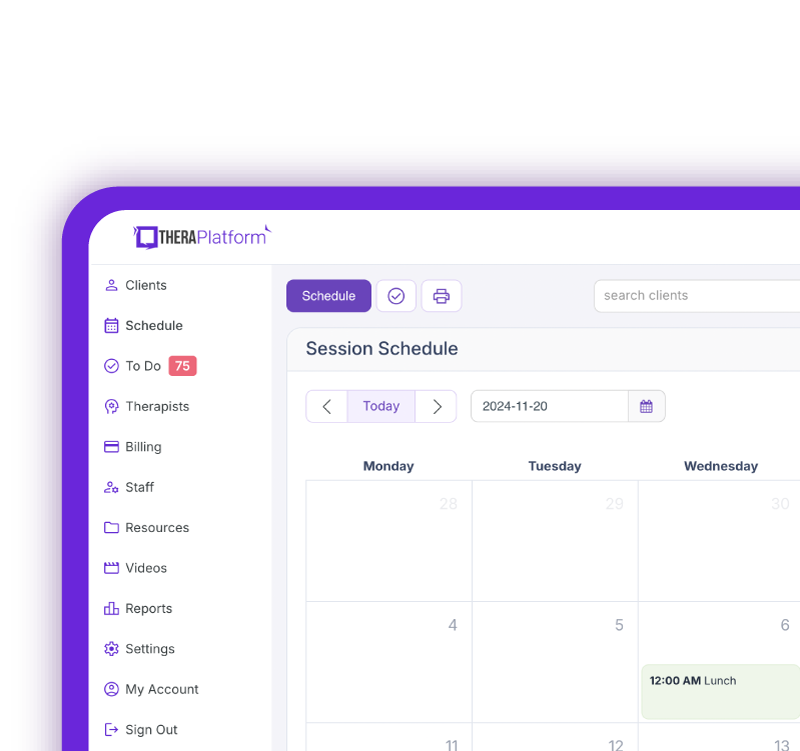CPT code 96116

CPT Code 96116 is designed to notate the evaluation of cognitive functioning, emotional status, and mental health through a structured clinical assessment of thinking, reasoning, and memory. Accurate assessment and diagnosis are necessary for effective treatment planning in mental health and neurological care. CPT Code 96116 is typically billed for 60 minutes of face-to-face time with the patient. However, the time spent may vary depending on the case's complexity.
Summary
- CPT Code 96116 is used for structured clinical assessments of cognitive functioning, emotional status, and mental health, providing essential insights for diagnosis and treatment planning.
- This code is particularly valuable for assessing cognitive and behavioral impairments in conditions such as traumatic brain injury (TBI), stroke, dementia, and mental health disorders.
- Assessments include memory, attention, executive functioning, and emotional regulation evaluations, with standardized tools like the MoCA and MMSE, ensuring accurate diagnosis and tailored treatment recommendations.
- Proper documentation is crucial for insurance reimbursement, and CPT Code 96116 can be used alongside other evaluation codes to provide a comprehensive patient assessment. Enrolling in an insurance billing course for therapists can help providers enhance their knowledge.
- By leveraging an EHR like TheraPlatform for efficient documentation and claim submission, therapists can maintain accurate records.
→ Click here to enroll in our free on-demand Insurance Billing for Therapists video course [Enroll Now]
Neurobehavioral status exams are essential for identifying cognitive impairments and emotional disturbances that may stem from mental health disorders, neurological conditions, or traumatic brain injuries (TBI). Licensed mental health professionals can provide a comprehensive evaluation that informs diagnosis, treatment planning, and ongoing care.
Streamline your insurance billing with One EHR
- Claim batching
- Auto claims
- Automated EOB & ERA
- Real-time claim validation
- Real-time claim tracking
- Aging and other reports

When to use the CPT Code 96116
Common scenarios for using CPT Code 96116
CPT Code 96116 is a versatile tool used in various clinical settings to assess cognitive and behavioral functioning. It is particularly valuable for identifying cognitive impairments, emotional disturbances, and other neurobehavioral issues that may arise from neurological or mental health conditions.
Mental health conditions
Mental health conditions such as depression, anxiety, and schizophrenia can significantly impact cognitive functioning. For example, depression is often associated with difficulties in concentration and memory, while schizophrenia may involve impairments in executive functioning and social cognition.
Only licensed mental health professionals trained in neuropsychological assessment should use CPT Code 96116. This includes psychologists, neuropsychologists, and other clinicians with specialized training in cognitive and behavioral evaluations.
Using the CPT Code 96116 for mental health conditions
A neurobehavioral status exam helps assess mental health conditions and their cognitive and emotional aspects.
Key components include:
- Attention and concentration testing: Identifying difficulties in focus, which are common in depression and anxiety.
- Memory assessments: Evaluating verbal and visual memory to determine the impact of mental health symptoms on cognitive functioning.
- Executive functioning tests: Assessing problem-solving and planning abilities, which may be impaired in schizophrenia.
- Emotional regulation evaluations: Identifying mood disturbances and their impact on daily functioning.
Clinical example
A 45-year-old patient with major depressive disorder reports difficulty concentrating at work and remembering important details. The clinician uses CPT Code 96116 to assess cognitive functioning, identifies deficits in attention and memory, and integrates these findings into the patient's treatment plan, which includes cognitive-behavioral therapy (CBT) and medication management.
Watch this video to see how TheraPlatform’s EHR saves time on insurance billing
CPT code 96116 for cognitive impairments
Traumatic Brain Injury (TBI)
Traumatic brain injury (TBI) is a leading cause of cognitive and behavioral impairments, often resulting from accidents, falls, or sports-related injuries. Patients with TBI may experience a wide range of symptoms, including memory loss, difficulty concentrating, mood swings, and personality changes.
Using CPT Code 96116 for TBI
A neurobehavioral status exam under CPT Code 96116 is critical for assessing the extent of cognitive and emotional deficits following a TBI.
The exam typically includes:
- Memory testing: Evaluating short-term and long-term memory to identify deficits.
- Attention and concentration assessments: Using tools like the Test of Variables of Attention (TOVA) to measure focus and sustained attention.
- Executive functioning tests: Assessing problem-solving, planning, and organizational skills through tools like the Wisconsin Card Sorting Test (WCST).
- Behavioral observations: Noting changes in mood, irritability, or impulsivity that may indicate frontal lobe damage.
Clinical example
A 35-year-old patient who sustained a TBI in a car accident presents with difficulty remembering recent events and trouble completing tasks at work. Using CPT Code 96116, the clinician administers tests, identifies memory and executive functioning deficits, and recommends cognitive rehabilitation therapy to address these challenges.
Dementia and stroke are other examples of where CPT code 96116 can be used with accompanying cognitive impairments.
Practice Management + EHR + Telehealth
Manage more in less time in your practice with TheraPlatform

Using CPT the code 96116 for other neurological conditions
CPT Code 96116 is also used to assess cognitive and behavioral functioning in patients with other neurological conditions, such as Parkinson's disease, multiple sclerosis (MS), or epilepsy. These conditions can cause a range of cognitive impairments, including memory loss, slowed processing speed, and executive dysfunction.
How CPT Code 96116 is used
The exam identifies specific cognitive deficits and their impact on daily functioning. Key components include:
- Processing speed assessments: Using tools like the Symbol Digit Modalities Test (SDMT) to measure how quickly the patient processes information.
- Memory testing: Evaluating both verbal and visual memory to identify deficits.
- Executive functioning tests: Assessing planning, problem-solving, and organizational skills.
- Behavioral observations: Noting changes in mood, motivation, or social behavior.
Clinical example
A 50-year-old patient with Parkinson's disease experiences slowed thinking and difficulty multitasking. The clinician uses CPT Code 96116 to assess cognitive functioning, identifies processing speed and executive functioning deficits, and recommends cognitive training and occupational therapy.
Key components of CPT Code 96116
A neurobehavioral status exam under CPT Code 96116 involves several key components that require documentation:
- Clinical interview: The process begins with a detailed clinical interview to gather information about the patient's medical history, symptoms, and concerns. This helps establish a baseline understanding of the patient's cognitive and emotional functioning.
- Behavioral observations: The clinician observes the patient's behavior during the assessment, noting factors such as mood, affect, attention, and engagement. These observations provide valuable context for interpreting test results.
- Administration of cognitive tests: Therapists administer standardized cognitive or neurobehavioral tests to assess specific domains such as memory, attention, executive functioning, and language skills. Common tools include the Montreal Cognitive Assessment (MoCA) and the Mini-Mental State Examination (MMSE).
- Interpretation and documentation: The clinician interprets the test results, integrates them with clinical observations, and documents findings in a detailed report. This report should include specific recommendations for treatment or further evaluation.
Documentation example
"The patient underwent a clinical interview to gather information about their medical history and presenting symptoms. Behavioral observations noted mild anxiety and difficulty sustaining attention. The following assessment tools were administered: MoCA, Trail Making Test Part A and B, and the Beck Depression Inventory-II (BDI-II)."
Results
Provide a detailed summary of the findings, including strengths and weaknesses in cognitive and emotional functioning.
This section should be objective, specific, and supported by test results.
- Cognitive domains: Break down the results by the cognitive domain (e.g., memory, attention, executive functioning, language). For example, "The patient demonstrated significant deficits in verbal memory, scoring below the 10th percentile on the Rey Auditory Verbal Learning Test (RAVLT)."
- Emotional functioning: Summarize findings related to mood, anxiety, or other emotional factors. For example, "The patient scored in the moderate range for depression on the BDI-II, indicating significant emotional distress."
- Behavioral observations: Include any relevant behavioral observations that support the findings. For example, "The patient exhibited frequent frustration during tasks requiring sustained attention."
Example
"The patient's performance on the MoCA indicated mild cognitive impairment, with particular deficits in memory and executive functioning. Verbal memory was significantly impaired, as evidenced by a score of 18/30 on the RAVLT. Emotional functioning was also impacted, with a BDI-II score of 25, indicating moderate depression."
Treatment recommendations
Clearly outline how the assessment results inform the treatment plan.
This section should be actionable and tailored to the patient's specific needs.
- Interventions: Based on the findings, recommend specific interventions. For example, "Cognitive rehabilitation therapy is recommended to address memory deficits."
- Referrals: If additional services are needed, such as speech therapy or psychiatric care, include referral recommendations. For example, "Referral to a psychiatrist for medication management of depressive symptoms is recommended."
- Follow-Up: Specify any follow-up assessments or monitoring. For example, "A follow-up neurobehavioral status exam is recommended in six months to monitor progress."
Example
Based on the assessment findings, the following treatment recommendations are made:
- Cognitive rehabilitation therapy to address memory and executive functioning deficits;
- Referral to a psychiatrist for evaluation of depressive symptoms;
- Follow-up neurobehavioral status exam in six months.
Billing and reimbursement
Insurance Coverage
Before using CPT Code 96116, verify the payer's requirements to ensure compliance and avoid claim denials.
- Pre-authorization: Some insurance companies require pre-authorization for neurobehavioral status exams. Check with the payer to determine if this step is necessary.
- Documentation requirements: Payers may have specific documentation requirements, including test scores or a detailed rationale for the assessment. Be sure to review these guidelines before submitting a claim.
Combining with other codes
Therapists can use CPT Code 96116 alongside other evaluation or therapy codes to provide a comprehensive assessment.
- Scenario 1: If the patient requires both cognitive testing and therapy, combine CPT Code 96116 with CPT Code 90837 (individual psychotherapy).
- Scenario 2: For a more detailed evaluation, use CPT Code 96116 with CPT Code 96132 (neuropsychological testing evaluation by a physician or other qualified healthcare professional).
Example
CPT Code 96116 was used with CPT Code 90837 to provide a comprehensive assessment of the patient's cognitive and emotional functioning. The results of the neurobehavioral status exam informed the development of a tailored psychotherapy plan.
Best practices for using CPT Code 96116
- Selecting appropriate tools: Choose validated assessment tools appropriate for the patient's age, condition, and cultural background. For example, the MoCA is often used for mild cognitive impairment, while the MMSE is better suited for more severe cases.
- Interdisciplinary collaboration: In cases involving complex neurological conditions, collaborate with neurologists, primary care providers, or other specialists to ensure a holistic approach to care.
- Patient-centered care: Explain the purpose of the assessment to the patient and involve them in the treatment planning process. This fosters trust and encourages adherence to recommendations.
CPT Code 96116 is a valuable tool for assessing cognitive and behavioral functioning in patients with neurological or mental health conditions. By conducting thorough neurobehavioral status exams, clinicians can identify cognitive impairments, emotional disturbances, and other factors that impact a patient's quality of life.
The therapist's role in interpreting and integrating findings into a comprehensive treatment plan cannot be overstated. With proper documentation, billing practices, and interdisciplinary collaboration, the resources offered by utilizing CPT Code 96116 can enhance the quality of care and improve patient outcomes.
How EHR and practice management software can save you time with insurance billing for therapists
EHRs with integrated billing software and clearing houses, such as TheraPlatform, offer therapists significant advantages in creating an efficient insurance billing process. The key is minimizing the amount of time dedicated to developing, sending, and tracking medical claims through features such as automation and batching.
What are automation and batching?
- Automation refers to setting up software to perform tasks with limited human interaction.
- Batching or performing administrative tasks in blocks of time at once allows you to perform a task from a single entry point with less clicking.
Which billing and medical claim tasks can be automated and batched through billing software?
- Invoices: Create multiple invoices for multiple clients with a click or two of a button or set up auto-invoice creation, and the software will automatically create invoices for you at the preferred time. You can even have the system automatically send invoices to your clients.
- Credit card processing: Charge multiple clients with a click of a button or set up auto credit card billing, and the billing software will automatically charge the card (easier than swiping!)
- Email payment reminders: Never manually send another reminder email for payment again, or skip this altogether by enabling auto credit card charges.
- Automated claim creation and submission: Batch multiple claims with one button click or turn auto claim creation and submission on.
- Live claim validation: The system reviews each claim to catch any human errors before submission, saving you time and reducing rejected claims.
- Automated payment posting: Streamline posting procedures for paid medical claims with ERA. When insurance offers ERA, all their payments will post automatically on TheraPlatform's EHR.
- Tracking: Track payment and profits, including aging invoices, overdue invoices, transactions, billed services, service providers.
Utilizing billing software integrated with an EHR and practice management software can make storing and sharing billing and insurance easy and save providers time when it comes to insurance billing for therapists.
Streamline your practice with One EHR
- Scheduling
- Flexible notes
- Template library
- Billing & payments
- Insurance claims
- Client portal
- Telehealth
- E-fax

Resources
Theraplatform is an all-in-one EHR, practice management and teletherapy solution that allows you to focus more on patient care. With a 30-day free trial, you have the opportunity to experience Theraplatform for yourself with no credit card required. Cancel anytime. They also support different industries including mental and behavioral health therapists in group practices and solo practices.
More resources
- Therapy resources and worksheets
- Therapy private practice courses
- Ultimate teletherapy ebook
- The Ultimate Insurance Billing Guide for Therapists
- The Ultimate Guide to Starting a Private Therapy Practice
- Mental health credentialing
- Insurance billing 101
- Practice management tools
- Behavioral Health tools
Free video classes
- Free on-demand insurance billing for therapist course
- Free mini video lessons to enhance your private practice
- 9 Admin tasks to automate in your private practice
References
American Psychological Association. Guidelines for psychological assessment. Retrieved from https://www.apa.org/about/policy/guidelines-psychological-assessment-evaluation.pdf
Neuropsychological Testing https://www.apaservices.org/practice/reimbursement/health-codes/testing/neuropsychological-testing.pdf
Centers for Medicare & Medicaid Services. (2023). CPT Code 96116: Neurobehavioral status exam. Retrieved from https://www.cms.gov
https://downloads.cms.gov/medicare-coverage-database/lcd_attachments/34646_9/L34646_PSYCH017_BCG.pdf
Folstein, M. F., Folstein, S. E., & McHugh, P. R. (1975). Mini-mental state: A practical method for grading the cognitive state of individuals. Journal of Psychiatric Research, 12(3), 189-198. https://pubmed.ncbi.nlm.nih.gov/1202204/
Nasreddine, Z. S., Phillips, N. A., Bédirian, V., Charbonneau, S., Whitehead, V., Collin, I., ... & Chertkow, H. (2005). The Montreal Cognitive Assessment, MoCA: A brief screening tool for mild cognitive impairment. Journal of the American Geriatrics Society, 53(4), 695-699. https://pubmed.ncbi.nlm.nih.gov/15817019
World Health Organization. (2021). Neurological disorders: Public health challenges. Retrieved from https://www.who.int/publications/i/item/9789241563369



